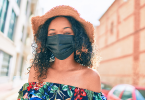To help prevent the spread of COVID-19, the U.S. Centers for Disease Control and Prevention recommends washing your hands with soap and water regularly. If you are unable to wash your hands, use a hand sanitizer that has 60% or more alcohol and don’t touch your eyes, nose, or mouth with unwashed hands.
Cue the “ewww”: According to the CDC, only about 31% of men and 65% of women wash their hands after using the bathroom.
And, only about 33% wash their hands before preparing food and about the same percent of people wash their hands before they eat, according to the U.S. Department of Agriculture and other studies.
Why people don’t wash is between them and their porcelain sinks, but experts agree that even if you don’t see visible dirt or germs on your hands, you have to clean your hands regularly to keep from getting sick.
So how smart are you—really—about handwashing? Test your knowledge right now.
1. How long should you wash your hands?
a. 6 seconds
b. 20 seconds
c. 30 seconds or more
Answer: 20 seconds or more. “The old adage in the medical world and the microbial world is, ‘The solution to pollution is dilution,’ and you can quote me on that,” said Dr. Jim Wilde, a pediatric emergency room physician and infectious disease specialist at Augusta University Health. “That means the more you rinse with water, the more you wash bacteria and viruses away.” While that doesn’t mean you have to scrub with soap and water until your hands are shriveled, aim for at least 20 seconds of washing and rinsing.
2. The best way to wash is with:
a. Soap
b. Antibacterial soap
c. Just water
Answer: Soap. Most truly antibacterial soaps should now be off the market, since it’s now well known that using too many antibacterial products tend to create super bacteria. And while rinsing and scrubbing with just water will remove some dirt and bacteria from your hands, adding in soap makes the best recipe for clean hands.
3. When you wash your hands, the water should be:
a. Warm
b. Cold
c. All of the above
Answer: All of the above. “Water temperature doesn’t really matter, except for comfort,” said Wilde. “But warm water does tend to remove things like dirt better.”
4. You can use hand sanitizer:
a. Anytime you want to “wash” your hands—it’s the same as handwashing
b. When you want to clean visible dirt on your hands
c. In between handwashing
Answer: In between handwashing. “If you don’t have physical debris on your hands, alcohol-based hand sanitizers are fine,” said Wilde. So are hand wipes advertised to “kill 99.9% of germs”—often available in the baby aisle. But washing with soap and water is still the best way to clean hands and should be done regularly. “Hand sanitizer will kill just about any germs on your hands, but there are some that aren’t killed by hand sanitizer that soap and water will take care of,” added Wilde.
5. The goal of handwashing is:
a. To sterilize your hands
b. To dilute out dirt and germs
c. To do it every time you touch something you think is “dirty”
Answer: To dilute out dirt and germs. Here’s the truth: It’s a dirty world out there, folks. “You can drive yourself crazy thinking about door handles, countertops, hangers in a clothing store. Everything you touch has been potentially contaminated by someone,” said Wilde. “But the goal is not to sterilize your skin. The goal is to reduce bacteria and viruses on your skin to a significant enough proportion that you reduce the risk of those germs causing an infection to you.”
According to the CDC, always wash hands:
- Before, during, and after preparing food
- Before eating food
- Before and after caring for someone who is sick
- Before and after treating a cut or wound
- After using the toilet
- After changing diapers or cleaning up a child who has used the toilet
- After blowing your nose, coughing, or sneezing
- After touching an animal, animal feed, or animal waste
- After touching garbage
“As long as you’re washing hands for at least 20 seconds and using soap, that’s the most important part of cleaning your hands,” said Wilde. “You can use hand sanitizer, but soap and water is really all you need.”





